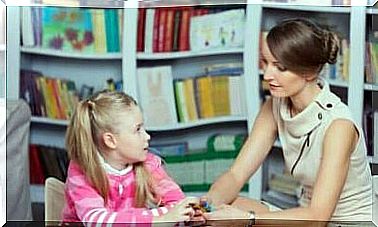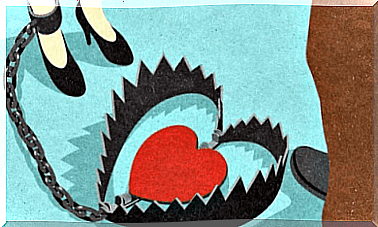The Consequences Of Ignoring Jealousy In Children
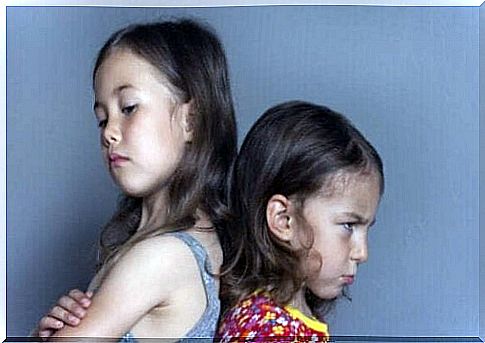
There was once a child who felt that they were the center of the universe. The child alone had the parents’ full attention. Then one day the child learned that a younger sibling was coming. This did not amuse the child at all. Fortunately, the parents soon learned that they had to pay attention to jealousy in children as soon as possible, so that the problem would not escalate.
Unfortunately, the parents were overwhelmed by the problem, and the child’s jealousy became chronic and even increased after a while. As a result, the relationship with the little baby deteriorated. The whole family was eventually overwhelmed by this situation.
Does this problem sound familiar to you? This article presents the scenario as a fictional story. However, this situation is very common and can lead to a lot of pain and suffering. It is not just triggered by the arrival of a younger brother or sister. In fact, there can be many reasons behind jealousy in children.
So what is the best thing to do? Jealousy in children may not be justified, but it is there and it is real. First, you need to take some precautionary measures to prevent it from happening at all. So observe the causes, analyze the symptoms and finally, seek professional help if the problem is beyond your control. Keep reading to find out more about what jealousy in children is about and why it happens.
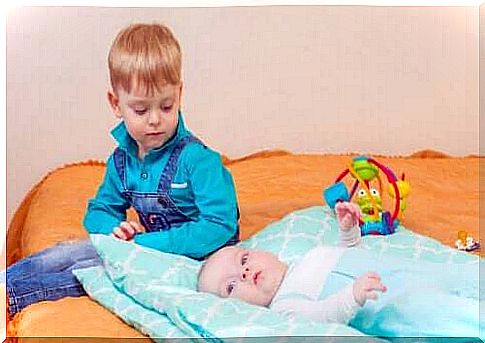
What is jealousy in children?
Jealousy is defined as a subjective condition that leads to frustration. This is due to the belief that an individual is not loved by those they love, such as by parents, siblings, partners, relatives and even pets. People do not really think there is a lack of reciprocity, they just notice changes in the intensity and frequency of people’s devotion.
In addition, jealousy does not have to be justified, and the child can continue to receive the same attention as before, even more than the new child . However, the pain is real in the mind of the person experiencing it. This may be due to a clinical disorder that requires specialized treatment.
A child may be in pain due to envy and resentment. However, there is still a cognitive distortion that can lead to negative consequences.
Sibling jealousy
This is common in children and is usually due to environmental and evolutionary factors. These can also be genetic and thus predispose the little one and even lead to serious consequences in their future lives.
Jealousy during the attachment phase
This depends on the age of the child. The situation is especially sensitive when a new sibling arrives at a young age, between two and five years old. This is because it happens in the child’s attachment phase.
Upbringing model
The parents’ pedagogical style as well as the family’s climate at home are also important factors to take into account in the development of the child and their reaction to jealousy.
Environmental factors
The child’s environment, own experiences, ability to socialize, tolerance and possible emotional deficiencies are also important factors.
Symptoms of jealousy in children
Various indicators can show you when you are dealing with jealousy in children, whether it is due or unfounded. These are the most common:
- Mood swings that occur for no reason.
- Signs of sadness, such as sudden crying.
- New behaviors such as bedwetting or lack of appetite.
- Changes in gestures and verbal expressions.
- A negative attitude and defiance.
- Systematic denial of one’s own mistakes and a tendency to blame others.
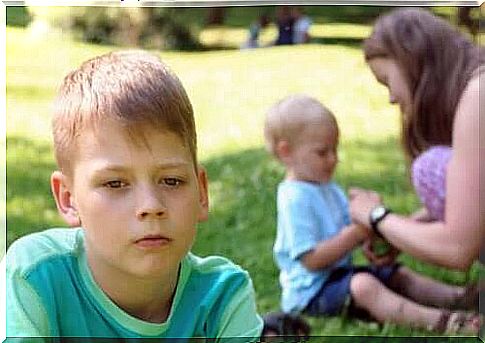
Strategies to prevent envy in children
When trying to prevent jealousy in children, you need to consider various useful strategies. Here are some important points when working with it:
- Analyze the origin of the jealousy. You need to be familiar with the child and the child’s circumstances, as you can only act accordingly if you know what triggers it.
- Involvement of all involved. You must set a course of action once you have identified jealousy, and everyone who is crucial to the child’s development must adhere to it.
- Avoid preferential rights if there are several children in your family.
- Positive confirmation. Emphasize what your child is doing right, and do not overemphasize the negative.
- Draw attention away from jealous behaviors such as tantrums and intentional disobedience.
- Enhance family activities and group play.
- Respond calmly to episodes of envy and avoid negativity and discrimination as much as possible.
- Remind them of their privileges when they consider everything negative. For example, talk about the benefits of having younger siblings, such as having a playmate if they are jealous of them.
Discouraging envy in children is important, as it can be a source of pain that can also affect interpersonal relationships. Seek professional help if the situation is out of your control, as a professional will be able to tell you what is best to do.



